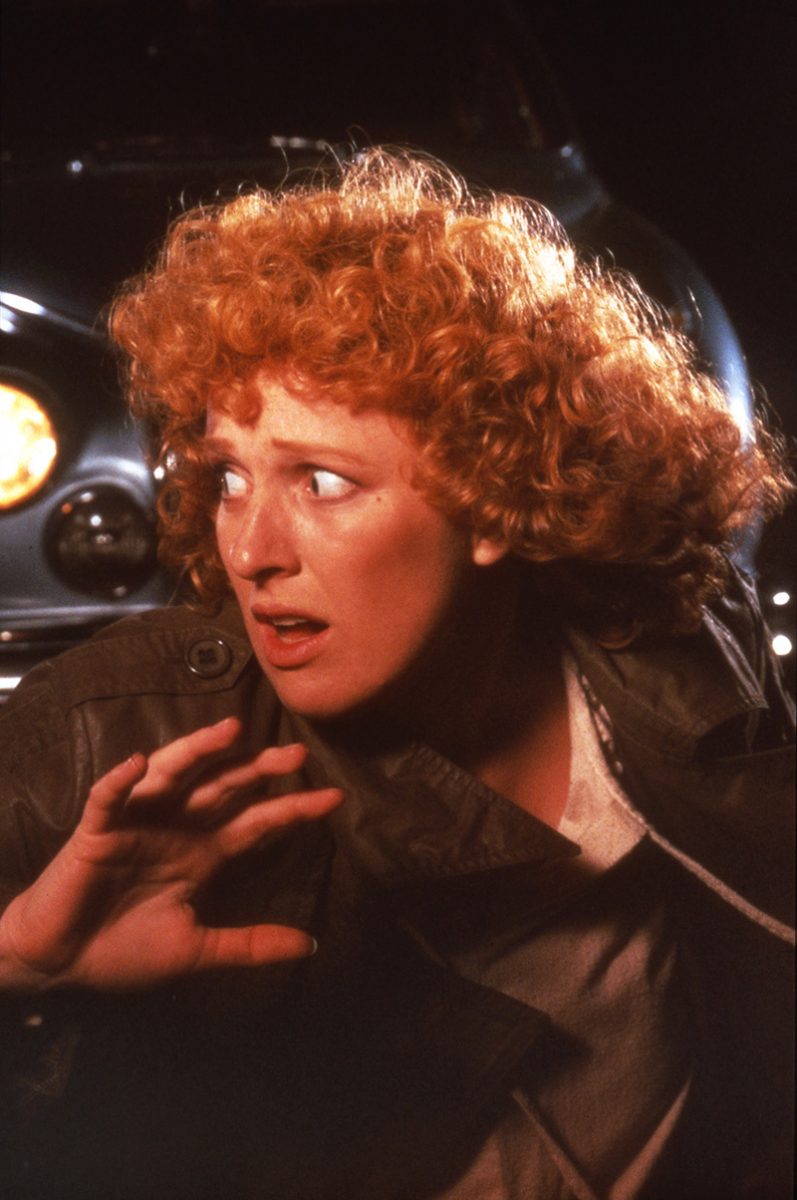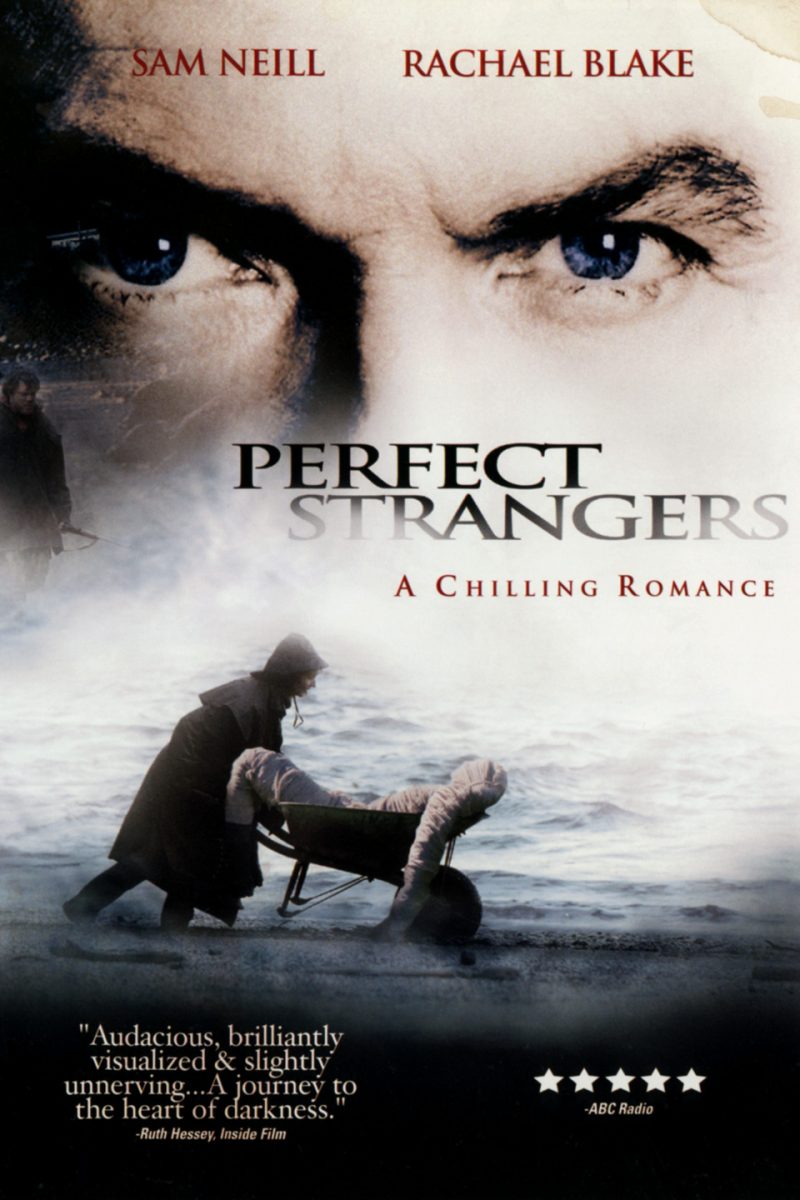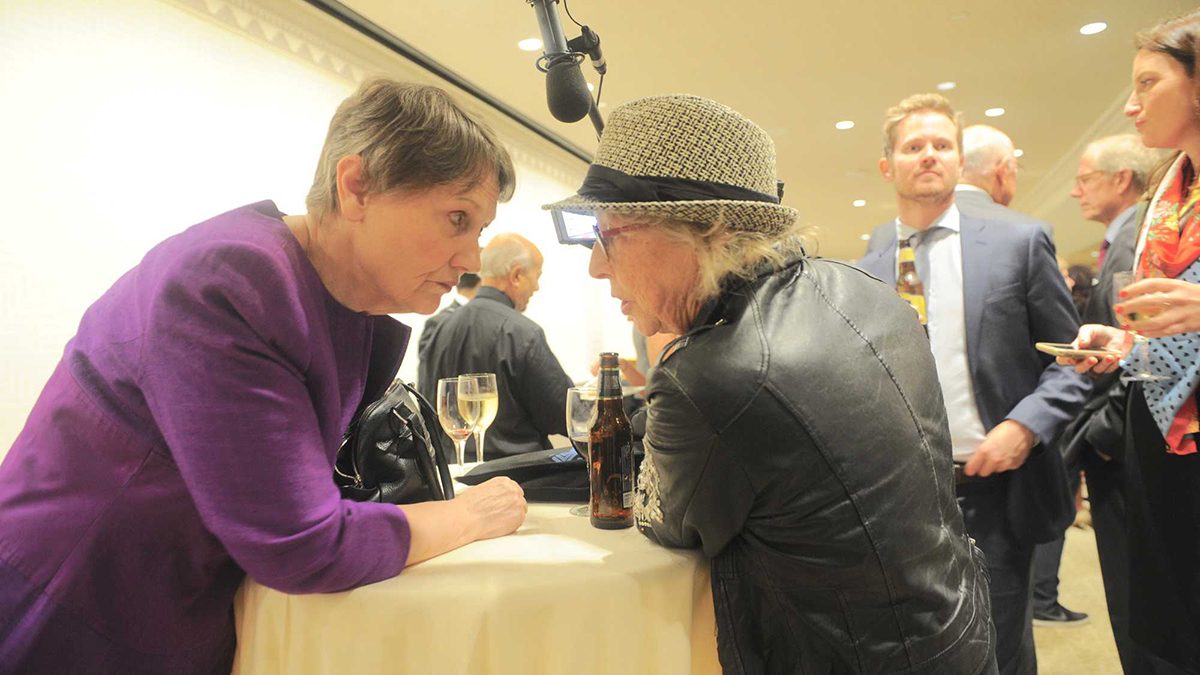“The history of Tasmania is a dark history,” said Briony Kidd, director of Stranger With My Face International Film Festival, to the tight community of filmmakers and their audience on opening night. “The Tasmanian Gothic is about the suffering of Aboriginal people and women and convicts. Their untold suffering is what we must talk about when we talk about a horror film festival in Hobart.”
Van Diemen’s Land is indeed the ideal, spooky setting for a feminist festival of genre cinema, now in its fifth year. Kidd’s curation is lean with an eye on the past and the forgotten, and early May brings 5.30pm sunsets and long nights of films and discussion at the Peacock Theatre, expanding beyond the strictures of horror to include mystery and suspense filmmaking. It’s an inclusive, chatty festival: a spirit of friendly camaraderie stretches beyond the screenings, aided by the involved presence of international guests (including Roxanne Benjamin, producer of the anthology film XX shown on opening night) and young filmmakers in the Attic Lab development program.
For me the retrospective programming stood out from the contemporary material. Kidd honoured the work of US cinematographer Sandi Sissel on the 1991 horror film The People Under The Stairs, saying that while many people think of it as a “Wes Craven film, it’s also a Sandi Sissel film.” It’s a fantastical genre piece, whose prologue and epilogue frame it as a brilliant satire of capitalism and racism: in a gloomy urban hellscape, white landlords are keeping their black tenants in poverty, biding their time until they can gentrify and sell their property at inflated prices. The centre of the film departs from this reality altogether. Sissel’s camerawork, largely devoid of CGI and instead resting on dynamic movement, hurls us around the haunted house of two demented slaveowner-landlords (played with hyper-theatrical relish by Wendy Robie and Everett McGill, who also both played Nadine and Big Ed in Twin Peaks around the same time), whose sadism finds a parallel in the real-life horror of systemic racism in the USA.
The grey-green slopes of the hillside city of Hobart found a perfect equivalent in the New Zealand settings of the festival’s major retrospective, a two-film stream dedicated to writer-director-producer Gaylene Preston. Coming of age in the 1970s—a time of intense feminist activity—shaped Preston’s trajectory as storyteller with a “consciousness-raising” agenda. “I suppose like a lot of people of my generation, I’d been brought up with the Hitchcock movies,” Preston told RealTime. “I also had a feminist analysis, and I felt that the way thrillers are structured is actually a danger to women. I thought the culture of thriller needed a bit of a shake-up.”
Mr Wrong
Though she’s spent the decades mostly making documentaries, for her first feature Preston flipped a common genre staple. Rather than a haunted house, Mr Wrong (1984) centres on a haunted car. Protagonist Meg thinks she has found the perfect vehicle: a gorgeous used Jaguar in top condition, which will afford her the freedom of long rides around the country and independence from her old-fashioned parents. But the Jag’s second-hand eccentricities give way to full-blown evil as it begins to exert a destructive force on her life. It emits the gasps of a dying man and delivers her human visitors who aren’t who they seem or who vanish into thin air.
Here a couple of themes come together: a satire on the delusion of the perfect man and what Preston described at the festival as “an interrogation of ‘nice.’ Meg is such a nice girl.” Men are forever invading her space and she’s forever accommodating them. When her housemate’s ex-boyfriend casually intrudes into their house, she finds herself making him a cup of tea; when the car salesman insinuates the Jag is too big for her, she’s polite in her insistence; when a strange man jumps into her car at the traffic lights, she asks him how far he’s going. Preston’s screenplay, based on a story by English novelist Elizabeth Jane Howard and co-written with Geoff Murphy and Graeme Tetley, is exquisitely attuned to the ways that sexism manifests in tiny pushes and pulls in the interpersonal spaces between men and women. The casting of Heather Bolton brings Meg’s niceness to vivid life: rather than the wide-eyed waif at the centre of many horror films, Bolton has the charisma and empathy of a regular person onscreen, and her hyper-animated expressions and transparent acting style give the sense of a young woman who’s been overlooked her whole life—who has done all the ‘right’ things, only to be left frustrated and exploited.
Meg’s niceness gives way to a quiet toughness as she comes closer to discovering the truth of her car’s haunting, a backstory that points to the film’s thematic undertow of gendered violence and missing women. Like the films of David Lynch, the true horror is realistically dark, coming not from the loopy or the insane but from the familiar and the domestic. Meg must not become the next victim.
Preston is too subtle a filmmaker to create a frame with brutality squarely in the centre: there’s not a whiff of exploitation. Cinematographer Thomas Burstyn’s camera is always slyly misdirecting our vision: you think a dangerous man is going to loom out of the background, only for him to pop out of a darker, unexpected space in the foreground. Indeed, Mr Wrong struck me as one of the few films of this type—a suspenseful thriller structured around the pursuit and capture of women—that doesn’t objectify women’s bodies in the formal ways that the camera shoots and frames them. Likewise, a sweet, sincere romance for Meg is a subplot rather than a narrative goal and a hinge for happiness, as well as a nice thematic hint that romantic contentment isn’t merely a myth. The final sequence’s message of solidarity between women—beyond the grave, of course—offers a closing flip of “the final girl” (the survivor in slasher films) horror trope and would be impossible in the films of Mr Wrong’s generic precedents by Hitchcock and De Palma.
What was most surprising to me was Mr Wrong’s arrival in 1984 when the NZ film industry was at such a nascent stage. Yet in Preston’s creation, genre knowledge, filmmaking skills and well-formed ideas are all there. This is deeply subversive and innovative filmmaking.
You can watch the trailer here.
Perfect Strangers
For her second feature, Perfect Strangers (2003), Preston conjured another perverse fairytale—in what she calls a critique of “the Disney version of romance [that] makes us dangerous to ourselves,” and an answer, 20 years later, to the questions raised in Mr Wrong. In a swift series of scenes totalling no more than a few minutes, we’re introduced to Melanie (Rachael Blake), a no-bullshit, independent woman out with her friends for the night. In contrast with Meg in Mr Wrong, Blake appears to be a tough, smart, wry woman familiar to us from her role in the 1990s ABC crime series, Wildside. She has a weird sense of sexual charisma anchored in her opaque approach to performance; she refuses to emotionally telegraph too much, holding back a lot from the audience, which gives her considerable power. At a pub, Melanie meets an unnamed man (Sam Neill), another Mr Right/Wrong who at first seems kind and gentle. When he asks her, “Your place or mine?” she answers, “I’ve been to my place before.” He takes her to an idyllic houseboat, but when Melanie wakes, she finds herself kidnapped to a windswept, gothic island (evoking memories of Jane Campion’s The Piano), where The Man has planned a forcefully romantic getaway involving candles, pearls and a black evening dress and pearls for her. It’s a sinister game in which she’s cast in the two-dimensional role of ingénue. But like Meg, we sense that Melanie is neither passive nor a femme fatale.
The great paradox shared by many genre films is that they tell the same story the same way, which means they fail to thrill. Perfect Strangers sets up a conventional expectation that the narrative will hinge on Melanie’s characterisation as a victim either escaping or dying on the island. Preston throws out this plot forecast and cultural familiarity within the first half hour, speeding up the usual three-act structure to free a further hour of plot twists that are so thrilling that I found them fantastically stressful. Preston shows that innovating a genre involves both knowledge of and non-compliance with convention. Here, the narrative twists are based on Melanie’s realisation that The Man is her only ticket off the island. This gives way to a kind of Stockholm Syndrome that reflects a deeper truth about relationships: that they inevitably involve some level of denial, and that delusion and devotion are closer than we can ever recognise. As with Mr Wrong, the narrative perversities stem from clear-headed psychological insight about what makes us hopeful in love against all logic. After the screening, Preston told festival-goers that she likes “long shots. When you cut, you let the audience out, psychologically.” That was evident. She never let us out of the confined and increasingly mad interior world that Melanie comes to know on the island.
SWMF’s small but considered retrospective of Gaylene Preston’s work convinced me of a few things. First, she is a legitimately legendary yet overlooked figure in genre filmmaking. Fame has eluded her for any number of reasons—she’s not American and commercial distribution precludes many of the most interesting filmmakers from showing on mainstream screens. Second, gender equity in the film industry cannot just be seen as something to be achieved on- and off-screen in the production realm. Change needs to happen at all levels of the industry: distribution, exhibition and festival programming. Small festivals like SWMF do important work in illuminating the blackholes in film history’s canon and providing local, intelligent injections to screen culture and politics outside franchise-drenched multiplexes. And yet there’s no dedicated stream of festival funding through Screen Tasmania, which provided SMFW with only a very small amount of sponsorship.
Gender inequity in film criticism has also contributed to the gaps in appreciation for filmmakers like Preston. Critics originally referred to Rachael Blake’s character in Perfect Strangers as a “lame-brained horror heroine”, and, we were told at the festival, to Mr Wrong as full of “quirks and Kiwi-isms.” Rather than being taken seriously, the films were seen as the whimsy of a mere woman. But the films’ thematic and emotional logic rang true to my experience, despite their outlandish plots. When so many critics have been (sexist) men, criticism begins to coalesce around a singularity of voices and experiences. So does storytelling itself. When it comes to ending gender inequity in cinema, Preston’s work reminded me that there is even more at stake than correcting rampant workplace discrimination in the screen industry. Storytelling changes when the gender of the storyteller changes, and Gaylene Preston has brought a uniquely female and feminist perspective to a male-dominated genre. The prospect of gender equality opens up so many new avenues for cinema: Mr Wrong and Perfect Strangers offer us a momentary, pleasurably perverse glimpse of unexplored directions.
Australian and New Zealand viewers can see Mr Wrong and Perfect Strangers on the New Zealand Film Commission’s VOD site, NZ Film On Demand.
You can read about Preston’s extensive film career here and here.
Gaylene Preston’s feature documentary, My Year with Helen about former New Zealand Prime Minister Helen Clark screens in the 2017 Sydney Film festival on 10 and 11 June.
–
Stranger With My Face International Film Festival, director, Briony Kidd, Salamanca Arts Theatre, Hobart, 4-7 May
Top image credit: Rachael Blake, Perfect Strangers






